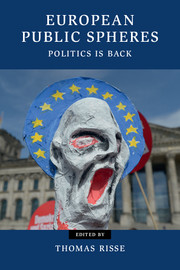Book contents
- Frontmatter
- Contents
- List of figures
- List of tables
- List of contributors
- Preface
- 1 Introduction
- Part I How to grasp the Europeanization of public spheres: theory, methods, empirics
- Part II Consequences: does the Europeanization of public spheres matter?
- Part III Theoretical and normative implications
- 9 Identity, Europe, and the world beyond public spheres
- 10 Democracy, identity, and European public spheres
- Bibliography
- Index
9 - Identity, Europe, and the world beyond public spheres
Published online by Cambridge University Press: 05 November 2014
- Frontmatter
- Contents
- List of figures
- List of tables
- List of contributors
- Preface
- 1 Introduction
- Part I How to grasp the Europeanization of public spheres: theory, methods, empirics
- Part II Consequences: does the Europeanization of public spheres matter?
- Part III Theoretical and normative implications
- 9 Identity, Europe, and the world beyond public spheres
- 10 Democracy, identity, and European public spheres
- Bibliography
- Index
Summary
Europeanized public spheres affect politics. This broad claim is accepted by all of the contributors to this book, even while they disagree on other issues: the precise extent of Europeanization in this area (a little or a lot); the way to measure public spheres (claims, frame, or discourse analysis); where precisely to look for such spheres (among elites and the quality media or a more bottom-up, civil-society view); and – finally – the politics being affected by them (party-political cleavages or identity politics). My purpose here is not to adjudicate among these disputes; the book’s opening chapter does an excellent job of highlighting and justifying them while persuasively demonstrating the common ground shared by all (see Chapter 1). Thus, the collection is a state-of-the-art treatment of the subject matter – European public spheres – in the best sense of that phrase: telling the reader what we have learned but also where our knowledge is incomplete or disputed.
My chapter continues with this last point, making three arguments about these loose ends. First, the workings of public spheres are ultimately claims about the ability of language and communication to shape politics. Elsewhere, however, such linguistic approaches have been supplemented by analysts arguing that institutions, power, and practice are important as well; a similar move seems absent in work on public spheres (see Chapter 8). The result is incomplete arguments – for example, on the relationship of public spheres to changes in European identity.
- Type
- Chapter
- Information
- European Public SpheresPolitics Is Back, pp. 227 - 246Publisher: Cambridge University PressPrint publication year: 2014
- 1
- Cited by

